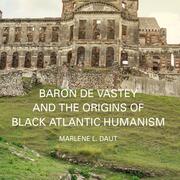Baron de Vastey and the Origins of Black Atlantic Humanism was named a co-winner of the 2019 Haitian Studies Association Book Award.
From the back cover:
Focusing on the influential life and works of the Haitian political writer and statesman, Baron de Vastey (1781-1820), in this book Marlene L. Daut examines the legacy of Vastey’s extensive writings as a form of what she calls black Atlantic humanism, a discourse devoted to attacking the enlightenment foundations of colonialism. Daut argues that Vastey, the most important secretary of Haiti’s King Henry Christophe, was a pioneer in a tradition of deconstructing colonial racism and colonial slavery that is much more closely associated with twentieth-century writers like W.E.B. Du Bois, Frantz Fanon, and Aimé Césaire. By expertly forging exciting new historical and theoretical connections among Vastey and these later twentieth-century writers, as well as eighteenth- and nineteenth-century black Atlantic authors, such as Phillis Wheatley, Olaudah Equiano, William Wells Brown, and Harriet Jacobs, Daut proves that any understanding of the genesis of Afro-diasporic thought must include Haiti’s Baron de Vastey.
Reviews:
"Daut's portrait of Baron de Vastey, secretary in the court of King Henry Christophe (1811-1820) and a prolific early Haitian writer, historian, and political theorist, is not simply a biography of an individual but is rather an engrossing examination of his work: how it came to be, how it traveled, and how it has influenced generations of revolutionary thinkers. Daut shows that while European philosophes were wringing their hands over questions of human agency, Vastey was at their heels, placing critical pressure on the most sacred fantasies of Enlightenment philosophy, like the idea that one might argue--without flinching--that "all men are created equal," while enslaving men, women, and children. From Haiti's shores, French and US revolutionary ideals don't look lofty--they look like lies."--Mary Caton Lingold, Public Books, April 2019
"...combines a deep knowledge of nineteenth-century Black Atlantic intellectual and literary history with an incisive view of our present day to reveal that we all have much to gain by looking more closely at the life, writing, and legacies of the Haitian writer Baron de Vastey."--Chelsea Stieber, New West Indian Guide, June 2019.
"An absorbing and riveting read, Marlene Daut's Baron de Vastey and the Origins of Black Atlantic Humanism is a scholarly feat."--Alessandra Benedicty-Kokken, Journal of Haitian Studies, Spring 2020.
"This is a richly documented study of this key figure in the invention of the radical anti-slavery movement and anti-colonialism, and will be essential reading for scholars and students of Haitian Revolutionary studies and postcolonial theory."--Nick Nesbitt, French Studies, July 2019
"[... ] offers an extensive, well-researched and compelling historicization of the formation and influence of Black Atlantic humanism."--Jacqueline Couti, Nineteenth-Century French Studies, Fall 2019
"Daut highlights the importance of Jean Louis Vastey’s writings, especially Le Système Colonial Dévoilé, which she sees as the first major statement of postcolonial theory and an effective response to tracts that ‘placed Haiti on the margins of both history and humanity.’...part of a burgeoning literature on the legacy of the Haitian Revolution....Marlene Daut’s... publications inspire a desire to know more about the memory of the Haitian Revolution in Haiti itself." --Jeremy Popkin, Slavery & Abolition. October 2020.


